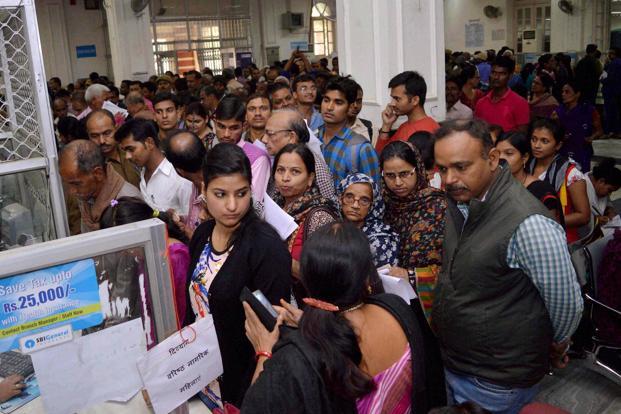Every single person is reeling under the impact of demonitisatioin
 NEW DELHI : From Kashmir to Kanyakumari there is confusion thanks to a series of events beginning with the `encounter’ death of the self-styled commander of the the militant group Hizbul Mujahideen in an encounter with the Indian security forces on July in the Kashmir valley.
NEW DELHI : From Kashmir to Kanyakumari there is confusion thanks to a series of events beginning with the `encounter’ death of the self-styled commander of the the militant group Hizbul Mujahideen in an encounter with the Indian security forces on July in the Kashmir valley.
For the next two months the national discourse was dominated by Kashmir, in the media, in Parliament when it was in session and outside the mega and mini conference halls across the country. It appeared as if the Kashmir is the root cause of all the problems plaguing the country.
The narrative took a dramatic turn on September 29 when the Indian security forces undertook never before publicised cross-border surgical strikes. India claimed that it had conducted “surgical strikes” against militant launch pads across the Line of Control in Pakistani-administered Azad Kashmir, and inflicted “significant casualties”. Indian media reported the casualty figures variously from 35 to 50.
Pakistan rejected the claim, stating that Indian troops had not crossed the Line of Control but had only skirmished with Pakistani troops at the border, resulting in the deaths of two Pakistani soldiers and the wounding of nine. Pakistan rejected India’s reports of any other casualties. At one stage it appeared war would be inevitable and every one was speculating wildly.
None other than the Prime Minister Narendra Modi interrupted the narrative with his `historic’ November 8 announcement on withdrawal of Rs. 500 and Rs. 1000 denomination notes in his address to the people of country.
Every single person in the country is reeling under the impact of the decision and has little memory of either the July 8 encounter or the September 9 surgical strikes. The impact of Mr. Modi’s November 8 decision is so huge that a change of regime in the United States of America with the election of Donald Trump on the same day has hardly registered on an overwhelming majority of the Indians.
Now no one has cash. Standing in the ATM or thinking of the ATM is the latest past time of most of the middle class Indians. After all without cash, how does one go about life?
There are several important developments that are going unnoticed and unregistered thanks to the commotion in the ordinary lives of the people triggered by the demonitisatioin. A gazette notification by the Ministry of Housing and Urban Poverty Alleviation on December 8 on rights related to shelter to homeless persons in urban areas best illustrates the point.
Actually the order or the notification is in pursuance of the Order dated November, 11 2016 of the Supreme Court of India on the Writ Petition(Civil) No. 55 of 2003 and Writ Petition(Civil) No.572 of 2003.
The notification by Sanjay Kumar, a Joint Secretary level officer pertains to the union government constituting a three member committee with Justice Kailash Gambhir as Chairman (Former Judge of the High Court of Delhi) and Neeraj Kumar Gupta as Member Secretary Retired officer of Delhi Higher Judicial Service and Sanjay Kumar, Joint Secretary, Ministry of Housing & Urban Poverty Alleviation as Member as deputed by the Government of India.
As per the Supreme Court Order the scope of work of the Committee shall be (i) The Committee shall cause physical verification of the available shelters for urban homeless in each state/Union Territories.
(ii) The Committee shall also verify whether the shelters are in compliance with the operational guidelines for the scheme of Shelters for Urban Homeless under the National Urban Livelihood Mission (NULM). (iii) The Committee shall enquire into the reasons of the slow progress in setting up of shelter homes by the States/Union Territories.
(iv) The Committee shall further enquire about non-utilization and/or diversion /misutilisation of the funds allocated for the Scheme for providing shelters to the urban homeless.
(v) The Committee shall issue suitable recommendations to the State Governments to ensure that at least temporary shelters are provided for the homeless in the urban areas to protect them during the winter season.
The State Governments shall ensure compliance with the recommendations along the time frame indicated by the Committee. Any non-implementation shall be drawn to the attention of the Supreme Court. The Committee is mandated to submit its report within a period of four months.

